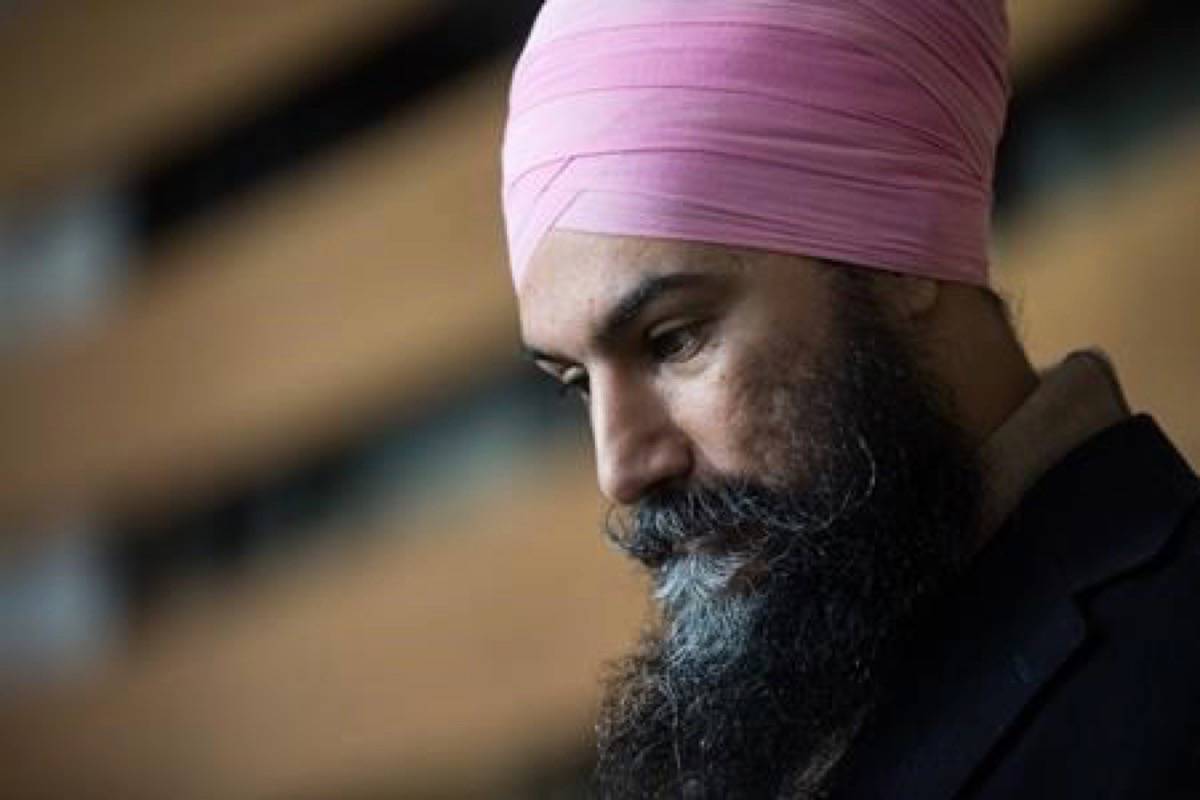Federal NDP Leader Jagmeet Singh is facing calls from within the party for a stronger stance on climate change as he defends his support of the $40-billion LNG Canada project in northern British Columbia.
Svend Robinson, the New Democrat candidate in Burnaby North-Seymour in the general election, opposes any new oil and gas infrastructure. Julia Sanchez, running for the party in a byelection in Outremont in Montreal, disapproves of the use of public funds for such projects.
Singh is seeking his first seat in Parliament in a byelection in Burnaby South. The leader opposes the Trans Mountain pipeline expansion that would increase tanker traffic departing from the Metro Vancouver city, but he approves of liquefied natural gas pipeline and export facility.
“The LNG project has demonstrated some clear, positive steps around consultation,” Singh said. “There was an exhaustive and pretty thorough consultation around Indigenous communities, First Nations communities and elected bands and chiefs.”
“There are people standing up and defending their land who have the right to express those concerns, and there’s still ongoing work that needs be addressed before this project moves ahead.”
Wet’suwet’en hereditary chiefs oppose a Coastal GasLink pipeline that would lead to LNG Canada’s export terminal in Kitimat. RCMP arrested 14 people at a blockade last month, sparking national protests.
Police later reached a deal with the chiefs to allow pipeline work to continue.
Coastal GasLink has signed agreements with all 20 elected First Nations bands along the pipeline.
Singh has tried to project unity in the party while facing internal criticism for poor fundraising and low support in the polls. If he wins the byelection Monday and remains leader, he is likely to encounter calls from his caucus for a tougher stance on climate change.
Robinson said he returned to politics after 15 years because of the latest report by the Intergovernmental Panel on Climate Change, the United Nations panel that assesses scientific evidence on global warming. The report concluded temperatures were likely to rise 1.5 C above pre-industrial levels between 2030 and 2052 unless drastic action is taken.
“The most important issue facing our planet and our country today is climate change. We have to effectively put the country on the same kind of wartime footing that we did at the time of the last world war to fight climate change,” Robinson said.
“If we are to do that, there can be no new oil and gas infrastructure.”
He said his specific concerns about LNG Canada include the increase in emissions associated with the project, the environmental impact of fracking and the importance of respect for hereditary Indigenous leadership.
Robinson would not say if he tried to change Singh’s mind on the project. But he said he hopes to influence the NDP’s fall election platform, and if he wins a seat, he will continue to bring his position forward around the caucus table.
Julia Sanchez said climate is the key issue she hears about on the doorstep while campaigning in Outremont, the riding previously held by former NDP leader Thomas Mulcair.
She has proposed a vision she calls the “Great Transition,” which urges an end to subsidies for the oil and gas industry and for public investment in new infrastructure. It also recommends more ambitious greenhouse gas emissions targets.
Sanchez said the NDP has made progress on its position on climate change over the past two years, but the party could go further. She noted LNG Canada benefits from $275 million in federal funding.
“I have a hard time seeing how we can justify making massive investments in projects in the oil and gas industry,” she said. “That means we’re not doing investments in renewable energy or … in supporting the transition of workers from the oil and gas industry to other industries.”
LNG Canada spokeswoman Susannah Pierce said the project has been designed to achieve the lowest greenhouse gas emissions of any large-scale liquefied natural gas facility in the world — about 50 per cent lower than the average facility.
The UN report models pathways to keep global warming to 1.5 or 2 degrees C, including one scenario that says natural gas use must grow while coal declines, Pierce said in a statement.
“Natural gas is clearly a part of the solution, as is natural gas shipped as LNG to Asia from B.C.,” Pierce said.
Simon Donner, a geography professor and climate-change expert at the University of B.C., said LNG Canada’s emissions represent a fraction of Canada’s 2030 target. But the project would operate for decades, making it harder for the country to meet longer-term targets, he said.
Singh has also faced pushback from the public for his support of LNG Canada. A protester recently interrupted a debate in Burnaby South to accuse Singh of “turning his back on Aboriginal people,” and the leader calmly listened and offered to speak with the man after the event.
READ MORE: NDP Leader Jagmeet Singh calls for public inquiry over SNC-Lavalin
READ MORE: NDP Leader Jagmeet Singh votes in advance byelection
Singh likely supports the project to align himself with the province’s minority NDP government, said Richard Johnston, a University of B.C. political science professor.
“He needs his friends,” Johnston said. “It means that the government of B.C. can be unembarrassed in supporting him in his attempt to get elected to Parliament.”
Laura Kane, The Canadian Press



